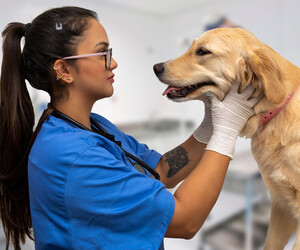What to Expect During Your Check Out to Veterinarian Greensburg
What to Expect During Your Check Out to Veterinarian Greensburg
Blog Article
Specialist Tips for Animal Nourishment From a Veterinarian
Recognizing the dietary needs of pet dogs is vital for their overall health and longevity. Vets suggest a well balanced diet that accommodates specific factors such as age, breed, and task level. Yet, with the wide range of family pet food options offered, pet proprietors commonly find themselves navigating a landscape swarming with false information and misconceptions. As we check out vital pointers from vet specialists, it comes to be evident that appropriate nourishment is not just regarding what is fed however includes a deeper understanding of each family pet's special demands. What crucial understandings could change your strategy to pet dog nutrition?
Understanding Nutritional Demands
Comprehending the nutritional requirements of animals is basic to guaranteeing their general wellness and well-being. Much like humans, family pets need a balanced diet regimen that provides essential nutrients, consisting of healthy proteins, fats, minerals, vitamins, and carbs. These nutrients play important roles in various physical features, such as energy production, immune reaction, and tissue repair work.
Healthy proteins are vital for development, fixing, and maintenance of body tissues - Veterinarian Greensburg. They are composed of amino acids, some of which are crucial and need to be acquired from food. Fats offer a concentrated source of power and are important for the absorption of fat-soluble vitamins. Carbohydrates act as a key power resource and can support digestion wellness when they include fiber.
Minerals and vitamins are required for metabolic procedures and preserving general wellness. Each pet may have one-of-a-kind demands based on elements such as age, breed, activity degree, and health and wellness standing. It is important to speak with a vet to figure out the particular nutritional requirements tailored to your animal's private needs, ensuring they obtain optimal nutrition throughout their life stages. Proper understanding and attention to these nutritional elements can dramatically add to a pet dog's durability and lifestyle.

Picking the Right Food
Choosing the ideal food for animals is an essential aspect of satisfying their dietary requirements. It is vital to take into consideration variables such as age, wellness, size, and breed status when choosing a pet food. Puppies and kitties call for solutions that support growth and growth, while adult family pets need balanced diet plans that keep their wellness. Elderly pet dogs may benefit from foods made to deal with age-related concerns, such as joint wellness or weight monitoring.
When assessing pet dog food options, search for items that fulfill the Organization of American Feed Control Officials (AAFCO) requirements, which make sure that the food offers well balanced and complete nourishment. Active ingredients ought to be high-grade, with genuine meat as the main resource of protein. Avoid foods with excessive fillers, synthetic ingredients, or spin-offs, as these can diminish the general dietary value.
Consulting with a vet can offer customized referrals based upon your family pet's specific demands. In addition, transitioning between foods should be done progressively to stay clear of gastrointestinal distress. By taking these actions, family pet proprietors can make certain that they are providing their fuzzy friends with the very best possible nutrition for a satisfied and healthy life.
Typical Misconceptions About Pet Dog Food
Debunking mistaken beliefs bordering pet food is essential for guaranteeing ideal nourishment for our furry friends. One common misconception is that all grain-free diet plans are superior for pets.

Furthermore, numerous family pet proprietors think that "costs" or "natural" tags guarantee better. These terms are usually unregulated and do not necessarily suggest premium Discover More Here dietary worth. It is important to inspect component lists and nutritional profiles rather.
Special Factors To Consider for Different Breeds
When it concerns pet nourishment, top article unique factors to consider should be thought about for various types, as each type can have unique nutritional needs and sensitivities. For example, big types such as Wonderful Danes and Saint Bernards are susceptible to musculoskeletal concerns and may benefit from diet plans developed to sustain joint health and wellness, commonly including components like glucosamine and omega fatty acids. Alternatively, little breeds like Chihuahuas may require greater calorie thickness to satisfy their power levels, demanding formulations that are abundant in nutrients yet reduced in mass.
Additionally, certain types may be inclined to particular health issues, such as food allergic reactions or sensitivities. Types like Labrador Retrievers might deal with obesity, requiring mindful portion control and a well balanced diet plan to maintain a healthy weight. On the other hand, breeds such as Dachshunds may be much more vulnerable to back issues, prompting a demand for diet regimens that advertise spine health and wellness and weight management.
Eventually, recognizing these breed-specific dietary needs is crucial for animal proprietors. Consulting with a vet can assist in selecting one of the most suitable diet plan customized to a specific pet dog's type, age, and health and wellness standing, making sure ideal nourishment and wellness.
Relevance of Normal Veterinary Exams
Understanding the distinct nutritional demands of different read the article breeds is only one facet of liable animal possession; regular vet check-ups play an important function in keeping overall wellness. These exams are vital for very early detection of health issues, ensuring that any type of possible troubles are attended to prior to they become severe. Routine brows through enable veterinarians to monitor your animal's weight, dental wellness, and important indications, which are critical signs of total wellness.
In addition, routine check-ups enable veterinarians to give tailored nutritional guidance based on your pet's private health and wellness standing - Vet Greensburg. As animals age, their nutritional requirements may change, and changes might be necessary to stop obesity or nutrient deficiencies. Preventative treatment, consisting of inoculations and parasite control, is also a basic component of these check outs, protecting your pet dog from various illness
In addition to checkups, these visits provide an exceptional opportunity for pet dog proprietors to review behavior changes or issues about their animal's consuming behaviors. By focusing on regular veterinary examinations, pet proprietors can ensure a longer, much healthier life for their furry companions, ultimately improving their quality of life.
Verdict
To conclude, ensuring optimal family pet nutrition requires a comprehensive understanding of individual dietary demands, proper food option, and awareness of prevalent misconceptions. Unique considerations for various types need to be accounted for, and regular vet exams play a vital function in keeping track of health and wellness and dietary changes. Abiding by AAFCO standards and talking to veterinarians before making dietary changes will improve the wellness of pets, ultimately adding to their longevity and high quality of life.
With the multitude of pet food alternatives offered, pet owners frequently discover themselves navigating a landscape rife with misinformation and myths. Each animal may have distinct needs based on variables such as age, type, activity level, and health and wellness status. It is essential to take into consideration factors such as age, dimension, wellness, and breed standing when selecting a pet food. Senior animals might benefit from foods developed to deal with age-related issues, such as joint health and wellness or weight administration.
Understanding the distinct dietary demands of various breeds is only one facet of liable pet dog ownership; regular veterinary examinations play an essential duty in preserving overall wellness.
Report this page